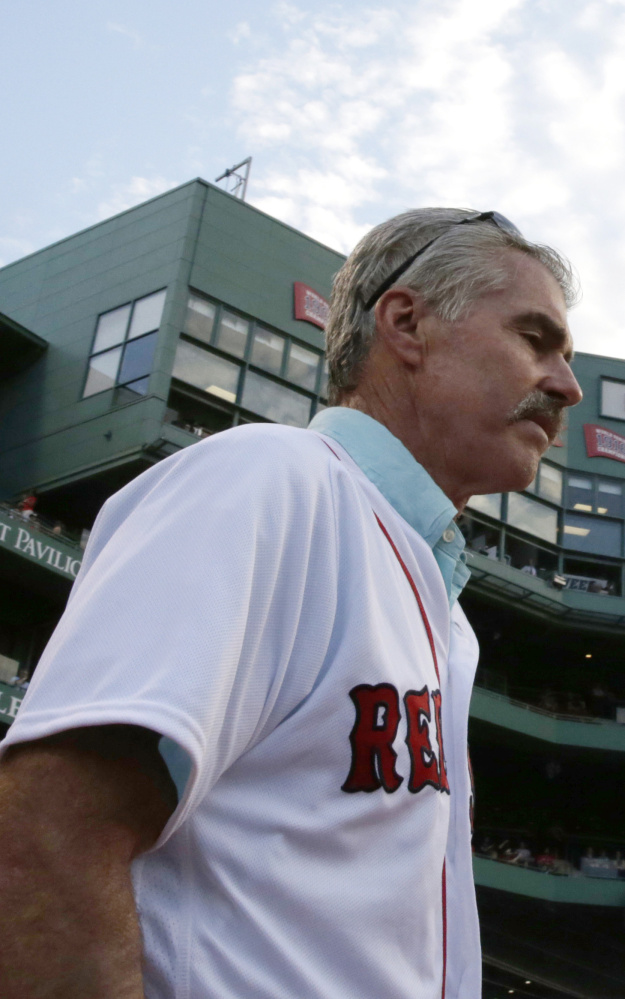His re-introduction to a more civil New England came eight years ago. Now Bill Buckner can visit baseball parks – he’ll be at Hadlock Field on Thursday night – and arrive as an accomplished baseball player, not just the one-man definition of the 1986 World Series.
“Most of (the memories of 1986) were good,” Buckner said recently at Fenway Park. “Obviously one of them wasn’t.”
Of course, and obviously unfairly, Buckner is best known for one play, the error he made at first base that allowed the New York Mets to score the winning run in the 10th inning of Game 6 of the World Series.
Never mind that Buckner had nothing to do with the two previous runs New York scored in the inning to tie it. A clean play by Buckner only would have assured more extra innings, not a win.
And never mind that it wasn’t Buckner’s fault that Boston lost Game 7 after leading 3-0.
Boston had not won a World Series since 1918. Frustrated Red Sox fans and media needed a scapegoat and Buckner – with countless replays showing the ball roll between his legs – became the prime target.
Buckner was ridiculed and constantly reminded of his failure. After retiring in 1990, he stayed away from Fenway.
But then came 2008. World Series titles in 2004 and 2007 had mellowed Boston. Buckner’s career, which included 2,715 hits and parts of five seasons in Boston, was looked at in a new light. With the urging of former teammate Dwight Evans, Buckner agreed to throw out the first pitch in the home opener.
As he walked onto the field, he received a long and loud standing ovation. Buckner got emotional, his eyes tearing up. A healing had happened.
“That was a special day,” Buckner said. “I really appreciate what the Red Sox did. I thought it was good for me and good for the fans.”
Buckner, 66, returned to Fenway two weeks ago when the Red Sox marked the 30th anniversary of the 1986 American League champs.
And he will be in Portland on Thursday night, throwing out the first pitch before the Sea Dogs’ game and signing autographs.
“I played 22 years in the big leagues,” Buckner said. “If you’d have asked me if I’d be OK with playing 22 years, winning a batting title, playing in two World Series, getting 200 hits in both leagues – but you played in a World Series game and you made an error, would you be good with that?
“Damn right I’d be good with that … that’s the way baseball is.
“You’ve got a winner and you’ve got a loser. You want to win but you don’t always win. That’s the way life is. That’s the way I look at it.”
In 1986, Buckner batted .267 with 168 hits and 102 RBI. As the Red Sox pulled away from the AL East in September, Buckner batted .315 with eight home runs.
“If he didn’t have the year he did, we would have never even made the playoffs,” said former teammate Wade Boggs. “To single out one person … we all had a part of not winning the World Series.”
Buckner appreciated that. “My teammates … know what’s going on. That error did not lose the World Series,” he said.
Buckner had been in one other World Series, with the Los Angeles Dodgers, losing to Oakland in 1974.
He was traded to the Chicago Cubs in 1977. In 1984, Chicago traded Buckner to Boston for Dennis Eckersley and Mike Brumley.
The ’86 team looked special and then seemed destined when Boston staved off elimination in the fifth game of the AL Championship Series on a home run by Dave Henderson.
“Beating the Angels in that Game 5 was the most exciting game I’ve ever been in,” Buckner said. “Hendu hitting that home run was a highlight of my career.”
And the career almost included a World Series title. Boston was one out away in the 10th inning when the Mets staged their comeback, completed by Buckner’s error.
“My first thought was ‘I get to play in the seventh game of the World Series. How cool is that?’ We felt we were going to win. We got off to a 3-0 start (in Game 7), had Bruce Hurst pitching …
“We had a great year. We came close. It didn’t quite happen. In sports you have to give credit to the other team. We felt like we had a good shot to win. But that Mets team won 105 (actually 108) games. That’s just the way it goes.”
Buckner shrugged. Losing a World Series, let alone making one error, does not define a career.
As his interview time was almost over, a radio reporter approached Buckner with two rapid-fire questions:
“How many times do you think about that play? Do you still have nightmares about it?”
Buckner let out a soft chuckle.
“No, not at all,” he said. “We’re good. It’s all good now. We survived.”
Send questions/comments to the editors.



